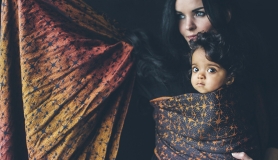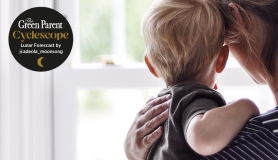When my son celebrates his second birthday in a couple of months, I won’t be making his cake. This is a personal breakthrough.
In the five years I have been a mother, I have lost a lot of sleep over birthday cakes. When my first child, our daughter, turned one I was determined to make her the perfect cake. I put aside the fact I don’t really enjoy baking and stayed up late into the night ordering specialist cake decorating equipment and watching tutorials on YouTube. In the end, I made three cakes, none of which lived up to the sponge and fondant master creations I had been aiming for. My daughter didn’t notice (I have the photo of her in a party hat with jam on her face to prove it) but as we helped her blow out her candles, all I could think was I had messed up her first ever birthday cake.
As a new mother, there were so many moments like this. Moments when I felt I was falling short.
After all, we had been trying for a baby for a long time. And now she was finally here, our precious daughter, I wanted to do everything right. Give her my best milk, the softest swaddle, a bath free of any kind of chemical that might harm her delicate skin. I bought every parenting book I could lay my hands on. Subscribed to every mother and baby site. I had been raised in educational settings where success was the reward for hard work, and I approached motherhood the only way I knew how, as if it were an academic exercise.
When our daughter cried, I thought she must be unhappy. When she wouldn’t sleep, I imagined I must have done something wrong. When I found it hard, I told myself I just needed to try harder.
Unhealthy messaging about motherhood
The books stressed the importance of getting out with the baby as soon as possible, so I ignored the pain of my yet-to-heal stitches, tucked her into the pram and went to see the other women from our antenatal class; I booked into baby groups and music classes where we sat in a circle with our babies and sang songs. I signed up for a course of baby swim lessons because my sister said we would love it. We didn’t. If my daughter was hungry, she would cry. If she was full, she would be sick, and we would be asked to leave the class. Unlike the babies in the posters on the walls of the café by the pool – those infants beaming as they are launched, unsupported, in the water – she did not enjoy the swimming and neither did I, so why did I put us through it? Because I thought I should. Because I thought these were the kinds of things a good mother would do.
And if I was looking for evidence to support this idea, I was in luck. There was, and still is, plenty of unhealthy messaging around motherhood about. Not that you can really blame the baby product companies. They wouldn’t hit many sales targets if the mother on the advert had bags under her eyes and a patch of milk sick on the shoulder of her tee-shirt.
The damaging effect of social media
Social media doesn’t help either, encouraging us to share heavily curated snapshots of our lives. We are hardly likely to caption the photo of us on the beach, looking tanned and happy with our arms around our children, with the truth: this picture makes it look as though we are having the time of our lives but, in reality, it was an awful afternoon. Too windy to stay on the beach. The children didn’t stop whining because they were hungry and wanted ice creams and I forgot to bring the bucket and spade. We all cried at least once.
I was just as guilty of promoting the fantasy. Friends asked me how I was, and I told them I was fine. Great actually, thanks. What I didn’t say was this: I am having a horrible morning. My baby screamed for three and a half hours straight, and I don’t know why. Not once did I confess I was worried I was a useless mother, because I had yearned for this baby and I was so lucky to have her and shouldn’t I be enjoying this, rather than feeling like I wanted to lie on the kitchen floor and howl?
Getting help
The turning point came when our daughter was six months old. My husband had become concerned about my persistent low mood and suggested I get professional help. I contacted a counsellor who specialised in post-natal depression and booked a session.
Our first appointment was challenging. I found it difficult to open up. I felt I was being disloyal to my daughter, expressing some of the bits about being a mother I was finding tough. But the counsellor was patient and kind, and once I started talking, I found I couldn’t stop.
Counselling was a huge help. I discovered I had been subjecting myself to incredible pressure. I’d had this image of a perfect 360 mother, a mother who was brilliant at everything, and when I felt tired or bored or frustrated, I believed I was letting myself and our family down.
Throughout our lives, the counsellor explained, we gather a collection of memories, images and anecdotes to create concepts. For many women, he said, the concept of motherhood has been heavily skewed, both through the template of the mother projected out by society as a one-size-fits-all, and our own experiences of motherhood.
This resonated with me. My mother is a fabulous baker, and she has always used cooking to express her love for the people around her. I still remember the cake she made for my fifth birthday. It was a fairy castle, with up-turned ice cream cones for turrets and piped rose plants climbing the walls. It was amazing. The kind of cake that belongs on Instagram. The kind of cake I imagined I would make for my daughter one day too.
Reaching a place of self-acceptance
Therapy wasn’t an overnight fix. It took me a long time, and many hours with a great counsellor, to reach a place of self-acceptance. One of the best tips he gave me was to speak to myself in the way I might speak to a friend who is struggling. Often, we are our harshest critics, but learning to treat ourselves with kindness and compassion is much more empowering than conviction and punishment.
Alongside therapy, I have found the practice of meditation to be a powerful tool. Stepping back from my thoughts and emotions allows me to recognise when I am measuring myself against others, or against some arbitrary standard that I have drawn up for myself. This separation also helps me to spot negative bias in my thinking. When I get to the end of the day, I am prone to dwell on the difficult moments. Why did I forget her wellies for the school trip? If I hadn’t been on the phone, I might have noticed that he was about to catch his finger in the door. One of the counsellor’s suggestions for me was to list the three things at the end of every day that I felt I had done well. It is incredible how a small shift towards the positive has changed the way I think about myself.
Postnatal period with no pressure
Our son was born in November 2020, just as the country was locking down again. It was a strange time to have a newborn baby. No one came to the house and, although there were phone calls and messages and even the occasional Zoom, where our son was held up to the camera for inspection like some kind of religious offering, we existed in a bubble. This had its upsides. Without visitors, there was no pressure. In the mornings, once our daughter had been dropped at her nursery, which was miraculously still open, I went back to bed with our son. We slept, fed, cuddled. I don’t think it is a coincidence that, this time round, I healed quickly. Unlike the recovery from my daughter’s birth, which was slow and painful.
It is, of course, easier when you have done it before. When our son cried, I offered him a feed, winded him, checked his nappy. It was exhausting and relentless, but I didn’t find it fearsome in the way I did with our daughter. I was less easily shaken, more trusting of my instincts. As a first-time mother, I was always looking for someone to validate me. Whether it was the woman at the supermarket checkout smiling fondly at my daughter or likes on a photo I’d posted of her first pair of shoes.I sought out reassurance from other people because, deep-down, I didn’t believe I was a worthy mother.
“I sought out reassurance from other people because, deep-down, I didn’t believe I was a worthy mother. ”
Good days and bad days
I remember seeing a woman with her baby on the underground when my daughter was still little. The baby was in a leopard-print sling, and the woman was kissing the top of his or her head. This mother seemed so serene, so content. I watched her silently, bursting with envy. As parents, it is easy to compare ourselves to others. But, as the counsellor explained, our comparisons are rarely based in fact. When I observed that woman having this lovely moment with her child, I imagined this was her permanent state. I didn’t consider that she, like me, has good days and bad days, that sometimes her baby, like my babies, is smiling and cheerful and at other times less so.
Children are not robots, and neither are mothers nor fathers. Sometimes I think we are so busy being parents, we forget we are humans too.
I am excited about my son’s second birthday. My daughter is already planning his cake, which should, she says, be one of his two favourite animals, a sheep or an owl. I have said we will buy a simple cake from our local bakery, and she can be in charge of decorating. I am sure there will be a second or two, as we put the cake in front of him, when I feel guilty for not attempting to make it myself. But then I will remember that there are lots of people who can make my son a lovely birthday cake, but I am the only person in the whole world who is uniquely and perfectly qualified to be his mum.
Henny Vere Nicoll is a freelance writer covering motherhood, fertility, miscarriage and women’s health. She lives in London with her husband and two children. Find her on Twitter @hennyverenicoll







